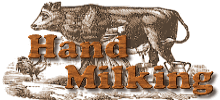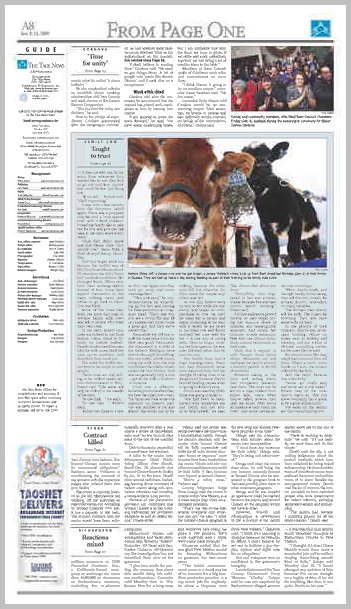|
|
 |
|


Tina Larkin
Heifers Daisy, left, a Jersey cow and her pal Angel, a Jersey Holstein cross, look up from their breakfast Monday (Jan. 5) at their home in Questa. They are tied up twice a day during feeding as part of their training to be family milk cows.

Tina Larkin
Rancher Robert Smith heads to the corral with a couple hundred pounds of hay for his cows on his converted heavy-duty lawn mower.

Tina Larkin
This is a six-pack of calf nursing bottles in the Smith?s kitchen. The couple is expecting a new calf in early February.
Taught to trust
-- if they sat with her. So for some time, whenever they wanted her to eat, they had to go out and lean against her, stand by her, just hang out.
"If we left," Robert said, "she'd stop eating."
It was only a few months later the dairyman called again. There was a pregnant cow, he said, a "very special cow" with a hoof problem. Would the Smiths like to take her for free and give the calf back to the dairy when it was born?
What they didn't know was that Fresca, their "very special cow" came from a kind of royal Jersey blood-line.
And that began what has become the Smiths' way of life. They have taken in about 15 cows from the dairy. Some had medical conditions, like damaged hoofs. Others only have three working udders instead of four. Some have injured themselves in the dairy milking room and refuse to go back in there. One was blind.
Some of the cows they keep, but most they train to become family milk cows and sell to people who want their own cows.
At the dairy, Robert said, cows are trained to run from human voices. There is virtually no human contact. People shout to herd the cows into the milk room, hook the cows up to machines, and then herd them back out.
The cows the Smiths rescue have to be taught to trust people.
"Some cows are only willing to be milked under certain circumstances at first," Robert said. "Like some will only be milked in the middle of the yard..." "In the dark..." Joy adds.
"In the rain...." Robert joins.
Robert ties them to a tree so they can figure out they can't get away and starts touching them.
"They pull away," he says, demonstrating by scrunching up his face and moving his head away from an imaginary hand. "Then, one day, you see a switch flip and all of a sudden they know you're a good guy and they move toward you."
Meanwhile Joy still has to milk the cows twice a day for their own good. Fortunately she discovered as a child at her father's Michigan farm that she has a gift for milking. She wet-milks, which means using the milk from the cow to lubricate the udder, which makes for less friction. And she can generally strip a cow -- get all the milk -- in about 10 minutes.
Every cow is different. Some begin to trust when they see how the other cows react. The blind one took some real ingenuity on Robert's part. She was terrified of Joy and Robert. She would line up for milking, because the other cows did, but otherwise she didn't want the couple anywhere near her. So one day, Robert went up next to her while she was eating and began to communicate in cow. He used his hand like a mouth and began crunching at the feed with it. Slowly he got closer to the blind cow and finally bumped her nose with his fist -- a cow way of saying hello. Then he began stroking her face upward, the way cows lick each other. And he won her over.
The Smiths have had a huge learning curve. There are, they discovered, some cows they can't help. And the thought of taking cows to be slaughtered because they're beyond healing causes tears to spring to Robert's eyes.
Fresca was one they didn't think was going to make it.
"She had been so bombarded with antibiotics she had totally lost her ability to heal herself," Joy said. "She almost died about five times."
"Everything that happened to her was a catastrophe because her immune system wasn't working," Robert said.
Further antibiotics proved useless. So they began giving her massive doses of vitamins and homeopathic remedies. And slowly, her immune system recovered. Now they use almost exclusively natural treatments on their cows.
Their diet is organic as well, bought from farms where chemicals are not used and the land is allowed a recovery period, so it's full of nutrients.
Between taking in the cows and selling them, they completely domesticate them. The cows can be led on a rope, milked from either side, come when they're called. Jerseys, they said, are smart. After about six months at their place, the cows' individual personalities start to emerge.
When they're ready, and the right family comes along, they sell the cow, usually for around $3,000, depending on many variables.
The females they always sell for milk. The males for breeding. They also raise some bulls for beef.
In the process of their business, they've also developed training videos on topics such as milking and breeding and run a kind of 24-hour consulting service for the cows they're sold.
It's almost more like they adopt their cows out than sell them. When a cow's water breaks at 2 a.m., the owners still call Joy for help.
And she helps, because that is her baby.
"Some are really easy and some are a real rodeo," Robert said of the cows they've taken in. "But you know eventually this is going to be a great relationship."